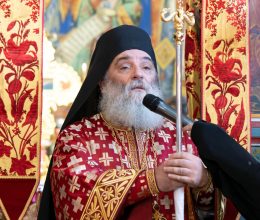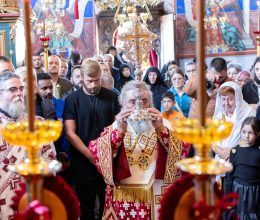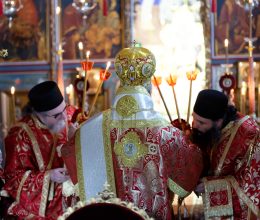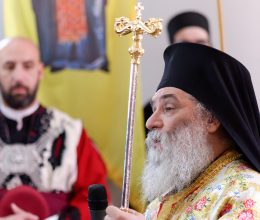Sermon of His Eminence, Bishop Parthenius of Antania, Abbot and Elder of the Bigorski Monastery, delivered on the Holy Liturgy on the Sunday of St. Gregory Palamas, in the chapel dedicated to him, in Rajchica, on the 28th of March 2021.

In the name of the Father, the Son and the Holy Spirit!
This day, my dear ones, the second Sunday of the Holy and Great Lent, the Church of God dedicated it to our Holy Father Gregory Palamas, the Miracle Worker of Thessaloniki. Today, however, we do not celebrate his memory according to the day of his repose – as all Saints are usually celebrated, according to the day of their repose, i.e. birth in the Kingdom of Heaven – but throughout the entire week and today especially we praise the greatness of his Divine theology. The feast of this great Saint of God, according to the order of the ecclesiastic typikon, comes immediately after the First Week of the Holy Lent, in which we celebrated the victory and the triumph of the Orthodox faith. In that Sunday of Orthodoxy we honoured specifically the Holy Fathers of the Seventh Ecumenical Council, who confirmed and established that the Son and the Word of God took flesh, became incarnate, became a Man equal in everything to us, except in sin. In fact, the essential theology of that very important holiday is that the unattainable, invisible and supernatural God, with the incarnation of Christ, the Word of God, has become visible, tangible to us. In other words, the fundamental conclusion of this Council is that “the Word has become a body, for the body to become a word”, which means that the goal of human existence is, namely, deification, becoming a god by grace. On the other hand, the loudest speaker of this God-revealed and redemptive truth was the famous Archbishop of Thessaloniki and Miracle Worker St. Gregory Palamas and that is why the Church of Christ dedicated this Second Week to him. Namely, at that time, in the middle of the 14th century, in the Eastern Roman Empire, as well as in the Balkans and beyond, a wide theological debate appeared, which affected not only the ecclesiastical circles, but also spread around from the public markets all the way to the imperial palaces. The main issue was regarding the ability to know God, i.e. how much man can know God and commune with Him, to what spiritual height he can reach, and whether he can reach that level at all, as to become a deified being, ie. god by grace. At that time, the West was dominated by the thought based on human logic, the humanistic ration, which was the scholastic teaching inspired by Aristotle’s philosophy. According to this teaching, the Divine Being is inexpressible, unknowable, unattainable, invisible, and incomprehensible – and it really is, and consequently, it is not possible for man to communicate with God. “How could man”, claimed the representatives of Western scholasticism, “to commune, to be united with God, when His essence does not allow it?” Only the most learned ecclesiastical people, through erudition and upgrading and constant practice of their intellect, can to some extent come to know certain qualities of God and nothing more. As for ordinary people God remains an unattainable abstraction. The main bearers and promotors of this teaching on Byzantine soil were the Calabrian monk Barlaam and his student Akindin from Macedonia.

St. Gregory Palamas got to love the monastic life from a young age and for a long time was ascetic on Mount Athos, where he lived the experience of the Holy Fathers and the mystical theology of the Church, gaining personal experience in the revelation of heavenly mysteries. By Divine providence, he was ordained a priest in Thessaloniki and later a bishop. A few years after his ordination to the priesthood, he began the struggle to defend the Orthodox faith and the teachings of the Church Fathers. We can openly say – something that is absolutely true – that the teaching of St. Gregory is, above all, biblical, God-revealed, confirmed by the life of the Church and the Holy Fathers. This great man of the sublime Christian theology was blessed by the Lord, and especially by the Most Holy Mother of God, to Whom he served zealously on the Holy Mountain and prayed with great love. The Immaculate Theotokos begged the Word of God, her Son, to give this man of God a strong word, so that he could confirm the Divine teaching of the Orthodox Church, established by God even before the creation of the world and man, in God’s redemptive Plan. Thus, with his blessed words, St. Gregory Palamas began to prove that the purpose of human life is nothing but deification, becoming the son of God by grace. This zealous and energetic preacher of the Truth inspired two local councils in Constantinople, one in 1341 and the other in 1351. At these councils his teaching was proven and confirmed, which, in a way, summed the whole experience of the Church and the Fathers and the biblical revelation that man can and should reach great spiritual heights; he should be united with God, become a god by grace, as Christ Himself says in the Gospel: Be ye therefore perfect as your Father which is in heaven is perfect! (Matthew 5:48). Now, according to what we have mentioned before, the question arises: if God is invisible, inexpressible, incomprehensible, unattainable, incomprehensible, then how can we be united with Him? The answer to this question is clearly given by St. Gregory Palamas, who explains that God is both an essence and an uncreated energy. Yes, God as an essence remains incomprehensible and unattainable for us, but through His uncreated Divine energies, He becomes both attainable and communable. The best example to explain this more simply is the Sun. Has anyone ever touched the Sun? Of course not, because no one can approach it by far. However, we still see the Sun and not only feel its energy, but we are in communication with it, through its rays. It gives life to the Earth, keeps us all alive. A similar thing happens with God, Whom we feel and communion with through His uncreated energies, we can also unite with God. So, yes, I can see God face to face – of course, not His essence, but His grace which is an inseparable part of Him.
And not only that I can but I should try, at all costs, to see God in my heart, even during this life. This is especially important. Many Christians today think: yes, we will see God one day in His Kingdom. But if we do not see Him now, in this life, if we do not attach ourselves to His energies, then we will not be able to see the face of God beyond us, in His Kingdom. As long as we are on Earth we should reach Him, through His Divine uncreated energies. This is acquired through repentance, prayer, good deeds, the whole mystical life in the Church, and through Holy Communion. Seeing God happens in the heart of man. “Blessed are the pure in heart, for they shall see God” (Matthew 5: 8) – says the Divine mouth of the Saviour. Therefore, if we do not purify our heart from the passions and attachment to things of this world, then certainly we would not be able to do so in the other as well. And sins and passions are an obstacle to seeing the immaculate face of the Lord. That is why it is necessary to start from here if we want to see God, attain that graceful union with God.
Many Christians today are comfortable with only the initial stage of spiritual life – the basic repentance – and stop there. But we have been given such a miraculous and Divine measure, because God got to love us so much that He invites us to be like Him, gods by grace. Most faithful, unfortunately, often reduce their spiritual life to mere confessing – often even mechanically, without feelings, without repentance and sincerity – and then leave thinking that they have done their job, that their relationship with God is fine now. But it is not so, my dears. Repentance is only the door; what lies further is the path to deification, to our union with God. It is necessary, therefore, to work constantly in order to be with Him, in our thoughts, in our deeds; May He always live in our hearts. Then we will live true repentance and be worthy of the Holy Communion. Modern Christians today lack a personal communion with Christ, an incessant communion with Him in their inner being. St. Gregory Palamas occupies such a prominent place among the Holy Fathers, because with his teaching he confirmed and sealed all biblical revelation and the experience of the Holy Father. And he had that skill and knowledge, because he lived among the simple monks of Mount Athos, who tried to have the Lord in their minds, in their hearts, in their thoughts, through the incessant prayer of the mind in their hearts. They lived for God and God was always with them. And when they were asleep, their hearts uttered the prayer, as the holy songwriter says in the Song of Solomon: I sleep, but my heart waketh (Song 5: 2). Such a Divine fire was St. Gregory, the Miracle Worker of Thessaloniki, who today sends us the same message as all the Holy Fathers: be a Divine fire in love, because our goal is deification. On this deed, the monks work especially hard, but it is only their privilege and duty. This goes also for every Christian, who is obliged to unite with God through unceasing prayer. St. Paul the Apostle commands not only the monks, but all the Christians to pray without ceasing (Acts 1:17). And St. John Chrysostom teaches us, saying: from morning to evening, all day and if possible through the night, call on the name of the Lord: Lord Jesus Christ, Son of God, have mercy on me, a sinner. Divine and holy purpose! God did everything we needed to do. He fulfilled His redemptive plan and sealed it on the Cross of Golgotha as well as with His life-giving Resurrection. It is now up to us to repent, but also to go up this Divine way, to see God face to face, praying incessantly. 
We are in a time full of temptations and uncertainties and that is why we need constant prayer and repentance. These days the people who came to me for confession talked mainly about the temptation that the world faced with the pandemic. My general conclusion is that one can notice a revolt against the measures taken by all governments in the world. People can no longer endure to stay indoors, wear masks, have no physical contact, etc. In some Western countries, they are even staging mass riots and strikes against government measures. They can not put up with the thought of being closed, being humble, because there is no prayer, no repentance, no spiritual life at all. We can not stand a single virus. And we know from history, what terrible plagues and temptations our ancestors endured. Today we can not stand anything anymore; we do not know what ordeal is, what struggle is, what prayer is, restraint, patience… In our time man has become as weak as never before. Weak! At the slightest temptation and shaking, he immediately falls spiritually and breaks. Psychiatric facilities and surgeries are overcrowded because people feel broken and powerless. Fear crept into their hearts. They are unnecessarily frightened of something they should not be, because they have previously lost the fear of God in their hearts. They do not want to talk and think about God.
On the other hand, they are not afraid nor rebellious against the spiritual virus which is set to destroy the Christian marriage, and with it the whole European civilization, based on that very marriage. Look at the tendencies everywhere: they want to equate same-sex relations with what we have called marriage for centuries, a blessed union between a man and a woman. These days, the Serbian Orthodox Church has issued a very nice statement in this regard. “The Church,” the statement said, “respects the freedom God has given us and understands the human desire to express our freedom in various ways” and allows for some kind of administrative regulation of same-sex unions in relation to certain personal, property and other rights. But “It is inadmissible to legally equate same-sex unions with marriage and family, as stated in the text of the Draft Law. In this way a discrimination is imposed on the marital union, as a Christian and legally protected value”, a community on which the whole of Europe and the entire civilized world is based. Remember all the warmth in your families. Should we let that treasure disappear?! By no means! Due to such a deviation from God’s laws, from God’s grace, today the whole nature rebels and retaliates with various disasters, epidemics, cataclysms. So, let us pray, my dear ones, that we Christians, offer sincere repentance, knowing what our goal is. This goal was beautifully and in a god-like manner described to us eighty years before the fall of the Empress of the cities – Constantinople, by the “pillar of fire of the Church”, St. Gregory Palamas. This was sealed by the local councils held in Constantinople, which are at the same level as the great Ecumenical Councils which established and confirmed the truth of the Orthodox Christian faith. May God give repentance to the world today, so that we may be courageous and not be afraid, for the One whose name we bear, Christ God, has conquered the world. Like Him, we too must conquer the world, and while still here, see Him in our hearts. Let us live with Christ, who said: The kingdom of God is within you (Luke 17:21).
May St. Gregory Palamas be our companion on the path to salvation and deification!















